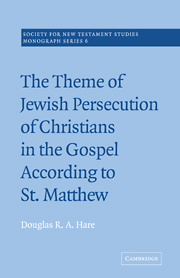Book contents
- Frontmatter
- Contents
- Preface
- List of abbreviations
- I General Remarks on the Nature of the Conflict between Jews and Christians
- II Survey of the Data of Jewish Persecution of Christians in Sources other than Matthew
- III References to Jewish Persecution of Christians in the Gospel according to St Matthew
- IV Matthew's Understanding of the Causes of Persecution
- V The Christian Response to Persecution by the Jews as Evidenced by Matthew
- VI Summary and Conclusions
- Appendices
- Bibliography
- Indices
III - References to Jewish Persecution of Christians in the Gospel according to St Matthew
Published online by Cambridge University Press: 25 February 2010
- Frontmatter
- Contents
- Preface
- List of abbreviations
- I General Remarks on the Nature of the Conflict between Jews and Christians
- II Survey of the Data of Jewish Persecution of Christians in Sources other than Matthew
- III References to Jewish Persecution of Christians in the Gospel according to St Matthew
- IV Matthew's Understanding of the Causes of Persecution
- V The Christian Response to Persecution by the Jews as Evidenced by Matthew
- VI Summary and Conclusions
- Appendices
- Bibliography
- Indices
Summary
EXEGESIS OF THE RELEVANT PASSAGES
Having now examined the non-Matthean data pertaining to persecution, we will turn to the relevant passages in the First Gospel. By comparing the Matthean with the non-Matthean data we will attempt to assess the accuracy with which Matthew reflects the conflict.
Matthew 23: 29–39
In Matthew 23: 34 it is predicted that messengers of Jesus will suffer violent persecution at the hands of the scribes and Pharisees. This passage will serve as a point of departure because of its unambiguous reference to Jewish persecutors and because of its occurrence in a chapter in which Matthew's hand is particularly evident.
Matthew's great discourse against the scribes and Pharisees is set within the Marcan framework, occasioned by the brief denunciation of the scribes which Mark includes at the conclusion of the disputes conducted in the Temple (Mark 12: 38-40). While Luke has here followed Mark closely, Matthew has greatly expanded the denunciation, combining material from the double tradition (Q) found in other contexts in Luke with material from his special source or sources.
In the Lucan version of the woes against the Pharisees, separate woes are enunciated against the lawyers, voiiiKoi (Luke i i : 37–52). It is instructive to note that two of the three woes in the second group are appropriate for religious leaders (Luke 11: 46, 52), while the three woes directed against the Pharisees (Luke 11: 42–4) are pertinent to rank-and-file members. This careful distinction between ordinary members of the Pharisaic party and their rabbinic leaders disappears in Matthew's version of the woes.
- Type
- Chapter
- Information
- Publisher: Cambridge University PressPrint publication year: 1967
- 1
- Cited by



